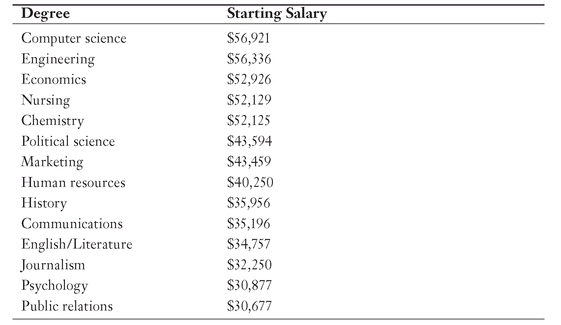Is Your College or Major Really Worth It?
Chances are, for every billionaire who dropped out of college, there are a hundred millionaires who went to some small college that didn’t have a football team or a single building named after someone famous. The reality is, as I’ve said elsewhere in the book, a college degree is a door opener for people seeking success but by itself does not guarantee success.
In fact, the difference in lifetime earnings between an education at an Ivy League school and your local state school would probably be negligible for most of us. Although no studies on the matter have been performed to my knowledge, my guess is that many (if not most) Ivy League or top 50 school graduates who end up making a ton of money either inherited a family business or had some serious connections outside of their college experiences. In short, it’s very possible that going to school is more important than where you go to school.
A Look at Return on Degree
The best use of your money might not be to spend as much as you can on the best school you can get into. In fact, studies have been done on students’ return on degree and return on major to determine which schools and degrees result in the most financial bang for the buck. In other words, how does their investment of tuition dollars pay off in income after graduation?

DEFINITION
Return on degree and return on major are simple ratios that measure how much a graduate with a certain degree or from a certain school will earn at a certain point in his career. They’re powerful tools when comparing the value of one college or major against another.
Although that might seem like a complex question to try to answer, the Internet is making it easier and easier. In fact, SmartMoney Magazine published a groundbreaking article in early 2009 that used readily available numbers on school tuition, as well as earnings surveys collected on PayScale.com from both recent and not-so-recent graduates. The findings were surprising. The Ivy League and highest-priced schools did not have nearly as good of a return on investment as many lower-priced public schools when tuition was compared against mid-career earnings for graduates from those schools.
For example, at the top of the list was Texas A&M, whose degree cost $18,297 in 1993, but whose graduates were earning an average of $96,100 15 years later. That yields a return on degree of 315 percent.
By comparison, the highest-listed Ivy League school was Princeton, with a total cost of degree of $64,150 and average earnings of $131,000 15 years later. In short, students at a school such as Texas A&M experienced a much higher level of future wages for every dollar they spent on tuition than those who went to a much more expensive school. For more information on this study, visit smartmoney.com.

WORLD WIDE WISDOM
You can spend a lot of money buying books and taking trips to try to decide which college is going to give you the most bang for your buck. Unfortunately, you might never get the questions you have answered. That’s where CollegeConfidential.com comes in. Its message forums are one of the best resources I’ve found for getting a student’s-eye view of what each campus and program is really like and whether a school lives up to its reputation.
Avoiding Useless Degrees
To be fair, no one’s college experience is useless because college is usually an incredible time of self-discovery. But from the perspective of getting paid to use what you’ve learned, some degrees are pretty low on the get-job-when-you-graduate scale. Of course, I’ve known a few people (there are always exceptions) who got off-the-wall degrees and now are really important people at Fortune 500 companies, making a ton of money. But for the most part, people with degrees in film appreciation have ended up working in the local video store.
Perhaps the most important thing to realize is that there is no single degree that savvy students pursue. Every degree is slightly different. Some careers pay a lot of money for people with a standard undergraduate degree but don’t really offer much advancement after the initial hire. Others don’t pay a whole lot right out of the gates but can earn you a lot of money down the road. Still others are hard to build a career on, unless you go back and get a graduate degree to go with it.
Thankfully, there are a ton of studies out there on what graduates with certain degrees are likely to earn, such as those listed in the following table. It would be worth your time to look at these numbers and compare them to the amount of time and money you’re going to put into your education to help you decide whether all this financial scraping and scrambling makes sense.
Degrees by Starting Salary (2008)

Source: CNN/CareerBuilder.com
Calculating Your Return on Degree
Although I wouldn’t advise trying to calculate the return on degree or return on major for every school and every degree in the nation, I do suggest using some basic calculations to evaluate the various programs you’re considering.
Here are my top techniques for crunching the numbers on a chosen degree or field of study. You can go to the Internet or call the colleges you’re considering to get the estimates you need to complete these calculations. If you’re using Internet sources, try to stick with the same source all the way through your calculations to ensure your results are consistent:
• Return on major (current)—To compute this number, you’ll need to divide the average first-year earnings for someone with a degree in your area of study by the total cost of you getting that degree. For example, for business majors, the National Association of Colleges and Employers (NACE) estimates that 2009 graduates will earn $44,607 in their first year after graduation. If your degree cost you $100,000, your current return on major would be 44.6 percent.
• Return on major (future)—This number can be a little harder to pinpoint, but it also means more. It gives you a sense of what someone with a certain degree is earning down the road, after he has built a career. The problem comes from finding estimates for careers 10 or 15 years out. Some of my favorite places to look for these income estimates are Payscale.com or the websites for the major financial magazines (for example, Forbes.com or Money.com). After you find the numbers, however, it’s the same calculation as the previous one. For example, according to PayScale.com, someone with a business degree and between 10 and 20 years of experience commanded a median salary of $66,464. Comparing that against the same $100,000 education, his future return on major is 66.46 percent.
• Return on degree (current and future)—Whereas the return on major calculations we just did look at a broad profession’s earning potential, the return on degree calculation looks at graduates from a particular school, regardless of their major. The calculation here is similar, except that you divide the current (first-year) salaries or the future (10, 15, or 20 years into their career) salaries for graduates from your school, instead of graduates with a certain degree. In a sense, this measures the value of a school’s reputation or education quality relative to other schools.
The magic of return on degree or return on major numbers comes when you compare them against other schools with different costs or other professions with different potential earnings. Only then will you get a clearer picture of how your choice of a school or major will pay off comparatively. Although some websites do provide these numbers, many colleges diligently track these numbers, so talk to a school’s enrollment counselor.
..................Content has been hidden....................
You can't read the all page of ebook, please click here login for view all page.
